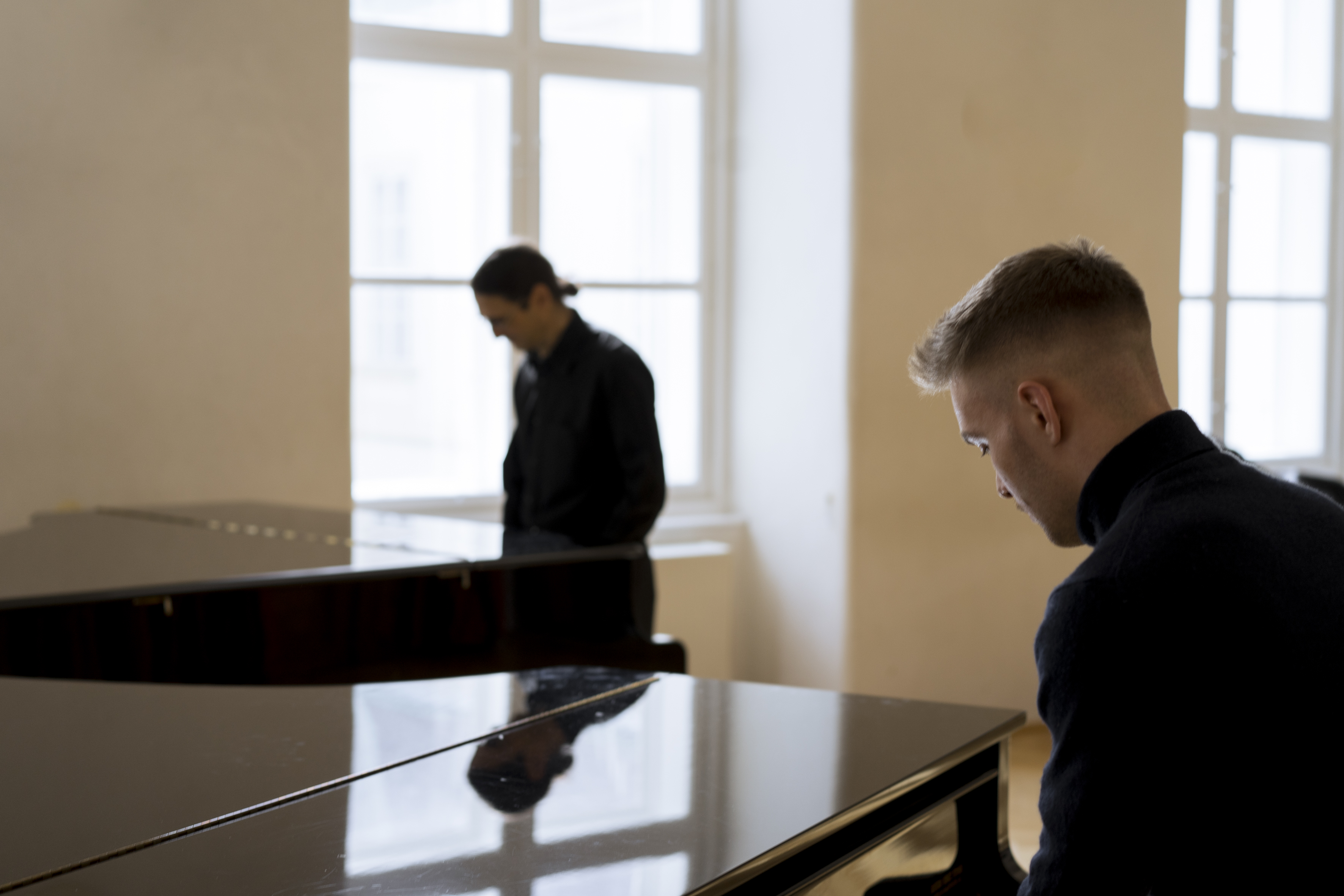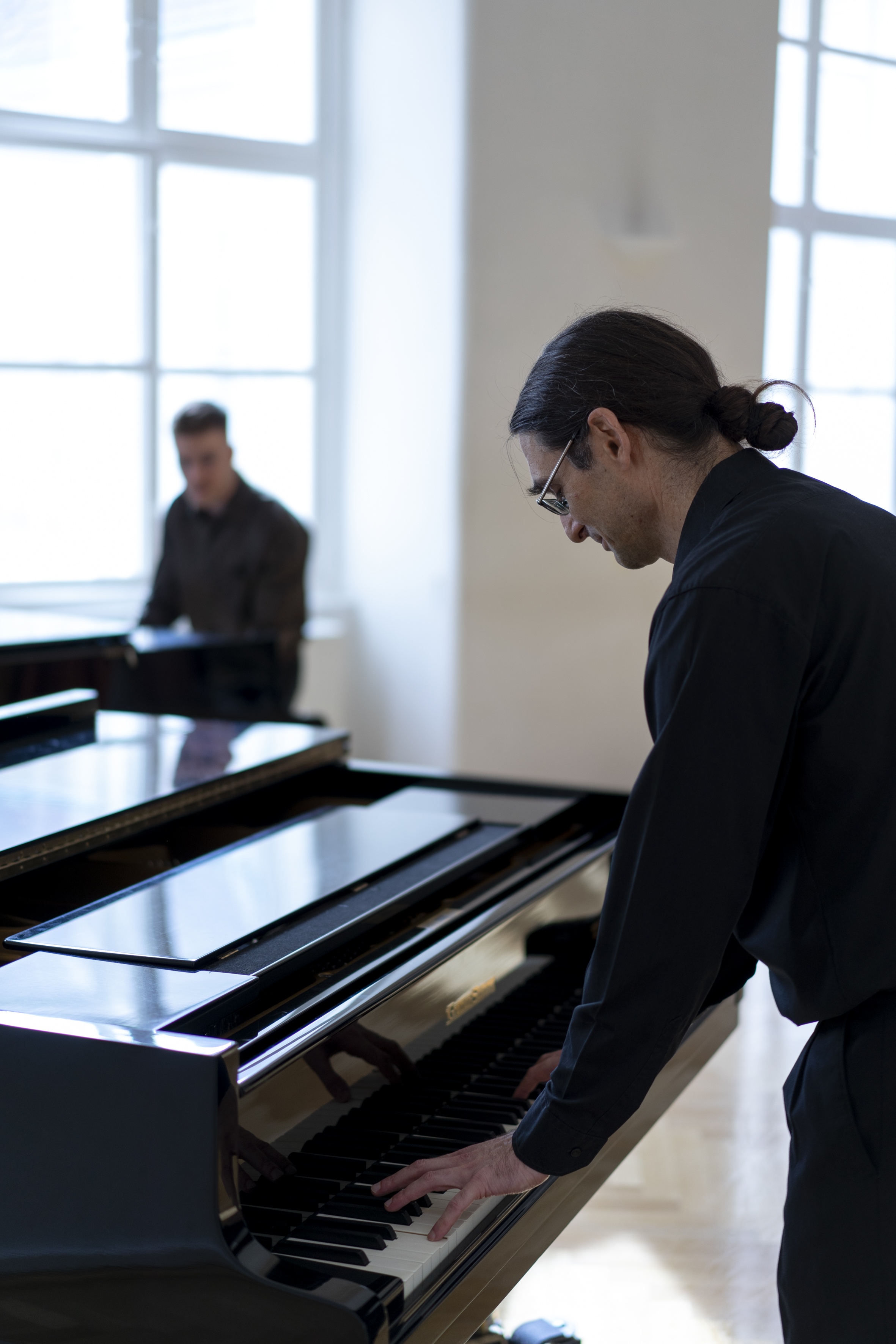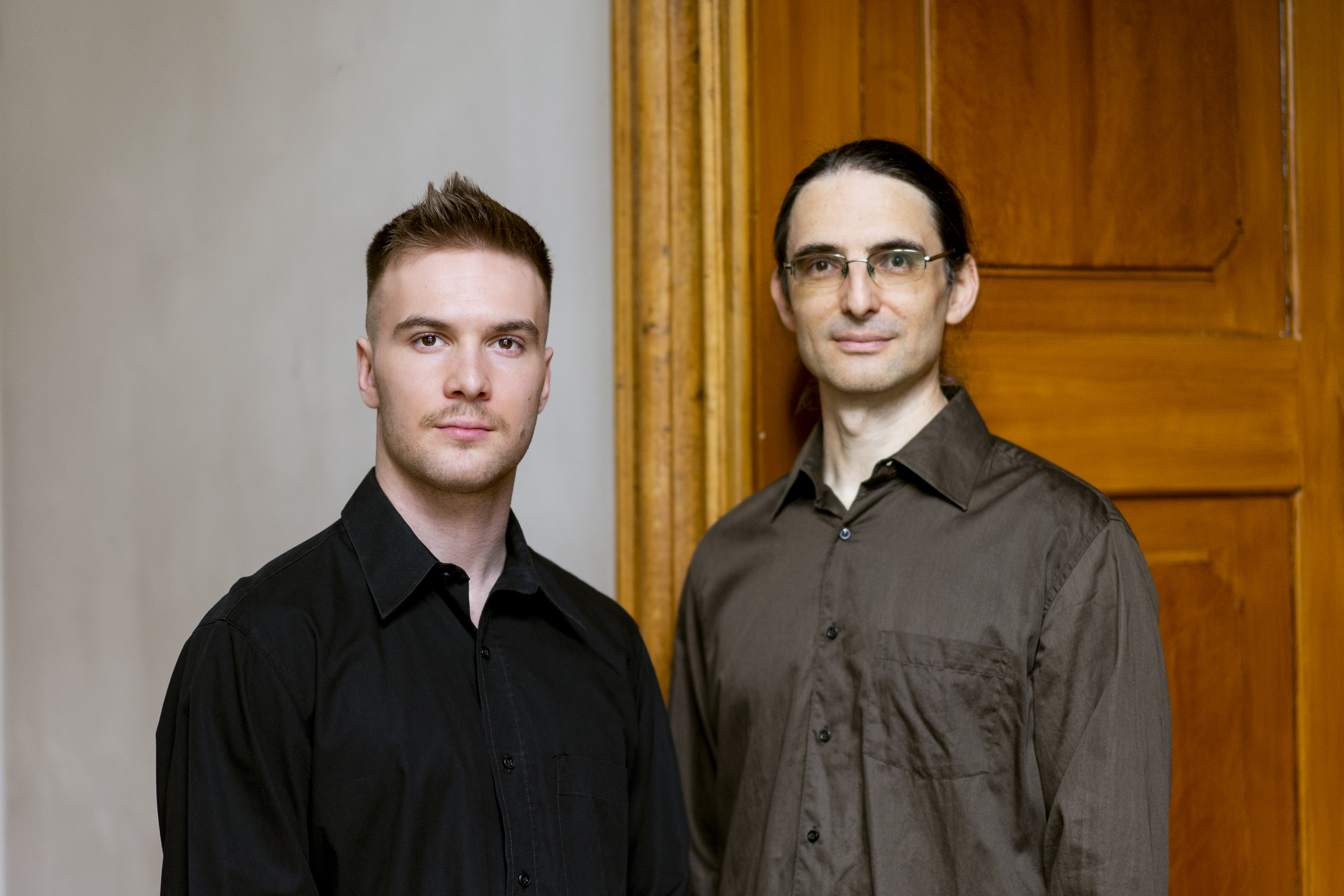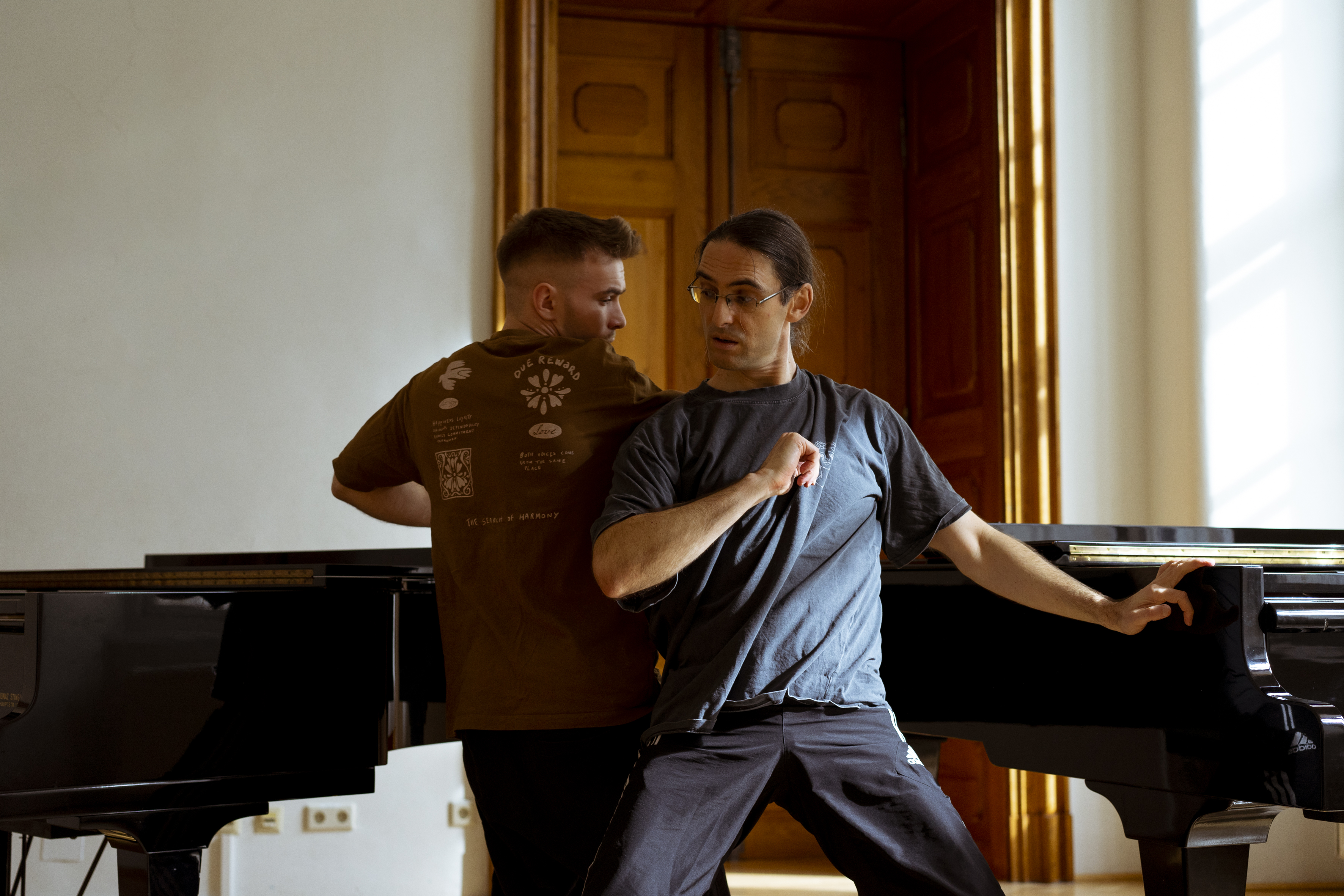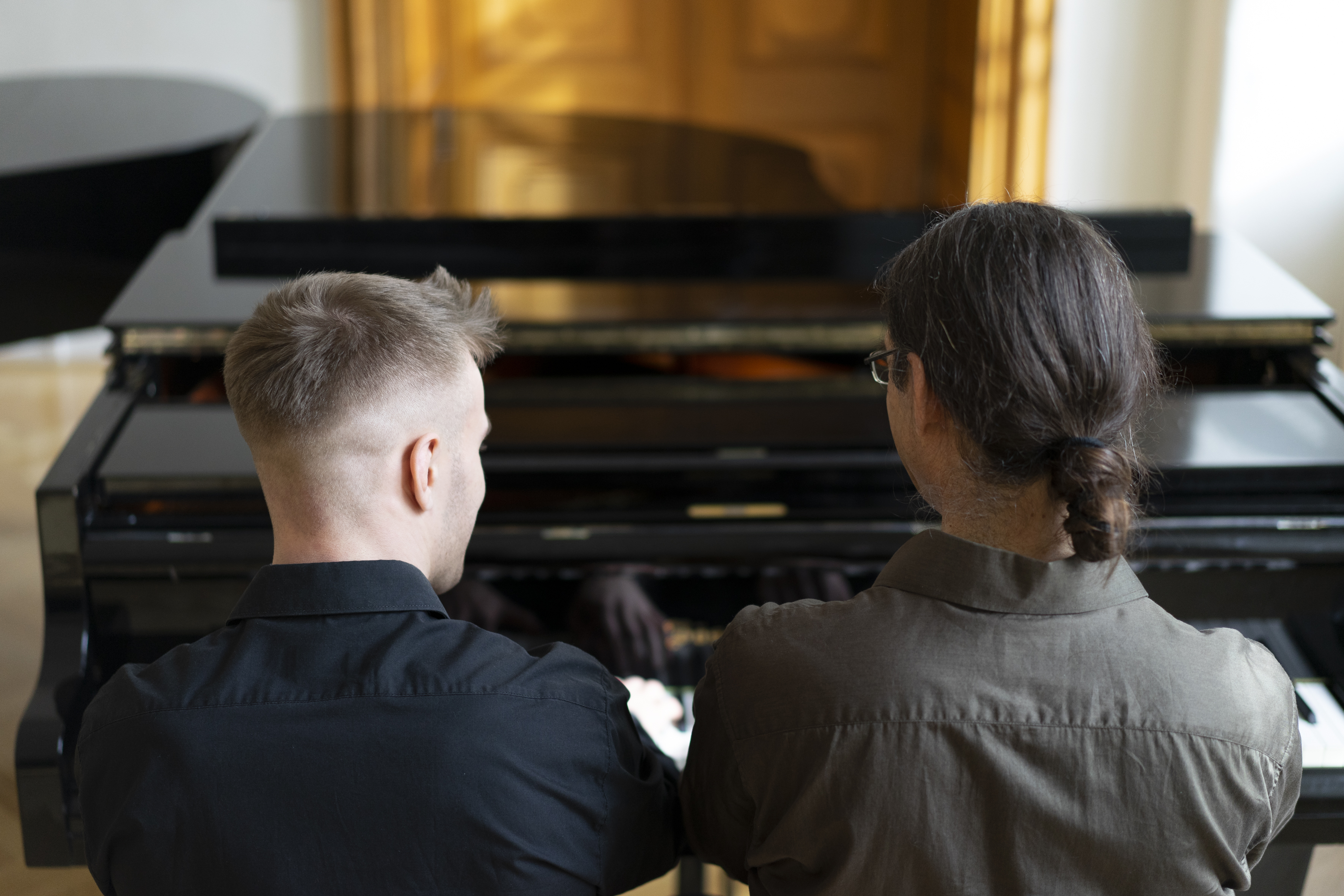
AMBO
AMBO is for us a vehicle for exploring; it is a search, something like an experiment; maybe it is the creation of a path. We explore the potential of our skills as pianists, movement artists, singers and composers, and we experiment with various other skills that we acquired during our studies in Vienna. We continuously search by formulating questions to help us understand our motivation: what is possible with our skills? what kinds of performances can we present? how can we create socially relevant interactions with our audience? Our aim is to let the format of a performance remain undecided and then shape the format when we have clarified our intentions. We hope to create contexts, and to not unthinkingly recreate concert formats of the past. We want to create an artistic path that is unique in some ways.
Alexander Okhotnikov and Hannes Taljaard met in the autumn of 2021 as students at the University of Music and performing Arts in Vienna. For two years one of us occasionally experienced the other perform as musician or movement artist. The first opportunity to cooperate in a project came in autumn of 2023 with the project ‘Ausgelöscht’: the preparation and presentation of two movement studies which were shaped by the collaborate music analytical actions of an ensemble of ten members. More projects followed, and this gave us the possibility to try out ideas and roles in various groups. During these projects we realised that our overlapping interests and our common training in Vienna contrasted well with our very different backgrounds, ideas and temperaments. The field of tension created by the overlaps and contrasts is one of the engines that drive our cooperation.
2027
Moving towards
The focus of our two-week residency in Morelia, Mexico will be on sound artists and movement artists working together to explore multidimensional overlaps and dialogues of sound and movement. During AMBO’s residency, carefully structured events will give impulses and develop strategies for artistic collaboration between movement artists and sound artists in Morelia. We trust that our presence at the Centro Mexicana para la Música y las Artes Sonoras will be a catalyst for lasting creative interactions among artists who are interested in interdisciplinary/transdisciplinary projects. We hope that participants who are interested in music education and movement education will also gain something valuable from these two weeks.
2026
Into piano improvisation – from movement over interaction
AMBO will present a five-day workshop for pianists as part of the International Artepiano Festival in Castelnuovo di Farfa in Italy. Participants will experiment with some of the many ways into improvisation, and experiments will be embedded in various forms of social interaction and musical listening. Participants will improvise together with other musicians, and we are sure that joyful, aesthetic experiences will create a rather stress free process. The last day will be dedicated to rehearsals for the evening´s public performance by participants.
Each of the four workshops will have a unique starting point for the unfolding of the multifaceted artistic-didactic processes that we will initiate and guide:
* Simple musical material that enables musicians to manage the cognitive load of improvisation: an example is the use of specific classes of intervals to generate a variety of textures and interactions
* Picture cards that organise a narrative line that is expressed first in silent actions and then in interactive accompaniment through sound of the narrative actions
* Tactile exploration of the characteristics of objects translated into movements and then into characteristics of sounds
* Nonsense language that dramatizes interaction between group members, and the subsequent and immediate translation of this dramatized interaction into ensemble improvisation
2025
I speak Dance
We will take part in a five-day workshop which will focus on language as a source of movement, and movement as a source of language. During this workshop participants will work on how people communicate, and on employing elements of dance in order to shape performances through clear and precise speech and movements. The workshop will be guided by Sabine Parzer from the holistic dance institute.
AMBO will accompany as sound artists on the 1st of November when participants will show to an audience the performances that they developed throughout the first four days of the workshop. The performance will take place in “Samdrubling”, at 74 Friedrich-Kaiser-Gasse, Vienna.
Listening Bodies – growing our ears through and for ensemble improvisation
This ninety minute workshop by AMBO was presented in Vienna as part of a Symposium of the Society for Dance Research which took place 25 - 27 September at the University for Music and Performing Arts Vienna (mdw) under the title Dance Resonance – Artistic Attunement in Motion (Tanz Resonanz – Künstlerische Weltbeziehungen in Bewegung).
This workshop was related to the one we presented in Luxembourg, and we placed the emphasis this time on how the listening skills of movement artists can be developed.
Thus, the question at the heart of this workshop was: how can movement artists develop their listening? At the start of the workshop participants showed intuitively in movement what they were hearing. The workshop proceeded through different phases which progressively construed a conceptual framework to organise listening systematically in terms of characteristics that are shared by sounds and movements. During the main phase of the workshop participants explored their growing understanding of sounds through accompanying and then directing the movements of another person by playing on simple percussion instruments, thus acting as sounding bodies that act upon other bodies.
The structure of the workshop rested on enactive cognition – a theory that we employ in order to structure rehearsals and develop performances. We use this theory as a scaffold that allow participants to grow through participatory sense-making and oscillating agency, two multisensory actions. Activities during the workshop were structured by strategies that we have been developing over the past two years. The activities rested on interactions that created open-ended process and allowed for reciprocal attunement within structured improvisation in different ensemble formats. The workshop was limited to 24 participants.
Artistic Research with eurythmics – interweaving of practice and theory
As the start of a ninety minute session at the Seventh International Conference of Dalcroze Studies at the University of Luxembourg (ICDS VII), AMBO presented a workshop based upon our ongoing work in a project at the University for Music and Performing Arts Vienna (mdw), a project that involves structured improvisations with music and movement in artistic contexts. Although there are many facets to our work in this project, this workshop focused on how we shape rehearsal processes based partly upon ‘Aural Sonology’, an approach to sound analysis developed in Oslo under the leadership of Lasse Thoresen (https://www.auralsonology.com). We showed how this systematic framework of concepts can be employed to understand and structure collaborative processes of generating sound and movement events and shaping these events into improvisatory performances through participatory sense-making and oscillating agency.
After our workshop and linked to it, Prof. Stephanie Schroedter (Artistic Research Centre, mdw) presented a paper that reflected on the fact that people perceive and understand music (spontaneously and intuitively) as movement. She answered questions on topics such as artistic means within the field of eurythmics and implications of insights from the field of enactive cognition for understanding listening and theory-building.
Into piano improvisation – from movement over interaction
During our four week tour in South Africa in February and March 2025, we presented workshops in piano improvisation at four universities and one secondary school. We worked mostly with groups of four to six participants, and once with a group of thirty-two participants. For these workshops we crystallised our work into four different types of workshops (or ‘modules’), types that are determined by the starting points of the multifaceted artistic-didactic processes that we initiate and guide:
* Simple musical material that enables musicians to manage the cognitive load of improvisation: an example is the use of specific classes of intervals to generate a variety of textures and interactions
* Picture cards that organise a narrative line that is expressed first in silent actions and then in interactive movement accompaniment of the narrative actions
* Tactile exploration of the characteristics of objects translated into movements and then into characteristics of sounds
* Nonsense language that dramatizes interaction between group members, and the subsequent and immediate translation of this dramatized interaction into ensemble improvisation
With these workshops we aimed to give musicians impulses for developing as improvisers – to those who start out, and for those who already have some experience with improvisation. We aimed to enable participants to experience how sound patterns and movement patterns can shape one’s learning how to improvise in interaction with others.
Alexander Okhotnikov wrote a dissertation on feedback he received from the participants who reflected on the ways that the experiences of movement influenced their improvisations. An English summary of this document can be downloaded here.
2024
Sing saam met my! (Sing with me!)
For this performance AMBO merged with allerdings to present dramatised versions of four songs composed by Hannes Taljaard. The cycle with the title Sing saam met My! (Sing with me!) has texts in Afrikaans, a Germanic language that developed in South Africa. With our performance we aimed to experiment with the artistic potential of our skills in a multicultural process. We specifically wanted to immerse our (mostly German speaking) audience into the world that the songs present, an audience who cannot rely on a printed translation. We realised that singing songs of which the words have been translated often diminishes the authenticity and power of the original artistic intention. And we also realised that singing the songs in their original language when this language is not understood by most or even all audience members, will most likely diminish the audience’s experience of the songs. So, the four of us came up with various solutions to the conundrum by experimenting with the tools of our trade: music, movement, objects and language. Our performance was the last work of a concert titled Moving Voices that took place on 19 November 2024 in the Neue Konzertsaal of the University for Music and performing Arts, Vienna. We plan to work on further versions of this performance, and hope that this work will become a part of our repertoire for several more years.
Arena Caliente
A composition by Alexander for two pianos were performed at a concert in the Haydnsaal of the University for Music and Performing Arts, Vienna. AMBO opened the concert with a flash, presenting ourselves as a ‘standard’ two piano duo. However, we hoped that the two different kinds of dances on which the composition is based, would hint – at least to those who knew who we were – at our other roles as movement artists. Judging by the reaction of the audience, an experience of music as movement was created. We plan to keep this composition in our repertoire as our ‘show stopper’.
Into piano improvisation – from movement, over interaction
AMBO presented a short workshop for pianists who were attending the International Artepiano Festival in Castelnuovo di Farfa in Italy. We experimented with some of the many ways into improvisation, and construed our workshop on the basis of our experiments. The way that we introduced in Castelnuevo took specific movements that form a foundation to help musicians learn rhythmic patterns, and that carry information about sound structures, for example information about categories of pitch collections, as well as phrases and melodic contours. The movements were embedded in various forms of social interaction and musical listening. We also took the manipulation of a divcerse collection of objects, combined with social interaction as the input for improvisations at the piano. This ensured that improvisation happened as an ensmble activity, together with other musicians, and contributed to creating a joyful, aesthetic experience and a rather stress free process.
Internationale Rhythmik Woche Wien
AMBO worked as assistants in Vienna for a Eurythmics practitioner from Stockholm, Eva Wedin, who presented four workshops (each lasting two hours) on her ways of teaching Eurythmics. As duo, we performed (piano duo and vocals) several compositions that formed part of the workshops, and participated in movement phases in order to facilitate interaction between participants and support Eva’s teaching.
